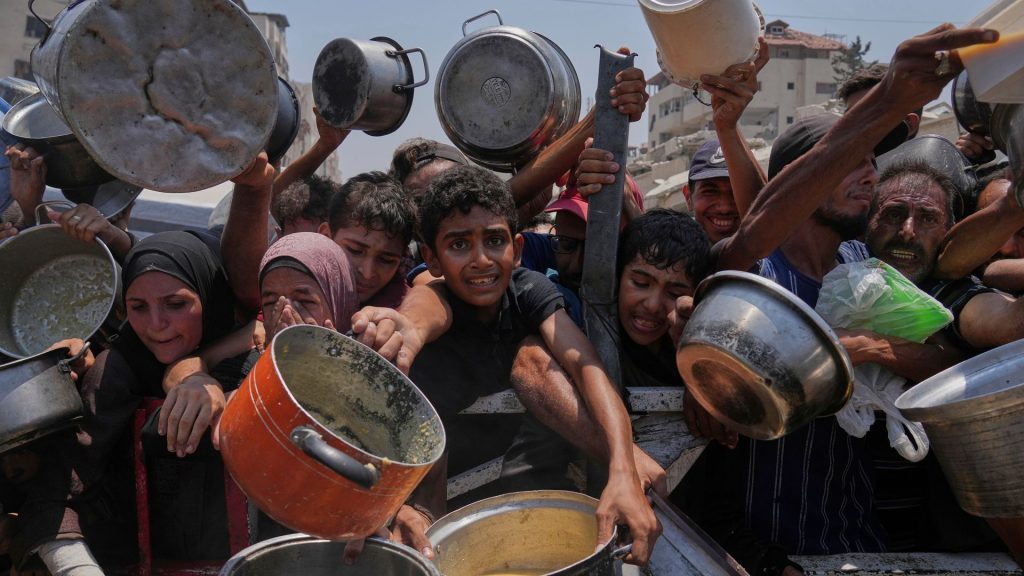IDF says ‘tactical pause’ in 3 areas of Gaza will allow ‘minimal’ aid into region

Israel implemented a “tactical pause” on its military operations in three areas of Gaza, which is ostensibly meant to allow “minimal” humanitarian aid into the enclave. The news comes as some in the international community have accused Israeli Prime Minister Benjamin Netanyahu’s government of carrying out a campaign of “deliberate mass starvation.”
‘Tactical pause’ to allow ‘minimal’ aid into Gaza
Netanyahu made the announcement in a video address Sunday, July 27, accusing the United Nations of making “excuses” about its inability to deliver aid. “There are secure routes. There have always been, but today it’s official. There will be no more excuses,” Netanyahu said.
The Times of Israel notes that approvals for aid trucks are “hard to obtain,” and that trucks that enter Gaza without approval “come under deadly IDF [Israeli Defense Forces] fire.” Similarly, the United Nations Office for the Coordination of Humanitarian Affairs (OCHA) reports that between July 16 and July 22, roughly 30% of 75 attempts to coordinate aid distribution with the Israeli government were “fully facilitated.”
According to the IDF, the “tactical pause” in military operations will be imposed between 10 a.m. and 8 p.m., in the heavily populated areas of Muwasi, Deir al-Balah and Gaza City, “every day until further notice.”
The IDF added that “designated secure routes will be in place permanently from 06:00 to 23:00 to enable the safe passage of UN and humanitarian aid organization convoys delivering and distributing food and medicine to the population across Gaza.”
The IDF said its decision was “coordinated with the UN and international organizations following discussions regarding the matter.”
Israel’s plan to allow more aid into the Strip comes as international pressure on the country has grown. In a series of posts on X between Friday, July 25, and Saturday, July 26, UNRWA Commissioner-General Philippe Lazzarini accused Israel of a “manmade hunger” and “deliberate mass starvation.”
According to the Gaza Health Ministry, 48 people have died due to malnutrition in the past three weeks, more than four times the number of people who died due to similar causes throughout the first five months of 2025. Additionally, OCHA reports that 20 children have died from severe acute malnutrition since January 2025 –– 13 of those deaths occurred in July alone.
As Straight Arrow News previously reported, the situation in Gaza has deteriorated to the point that even medical professionals and aid workers are at risk of starvation and death, according to Doctors Without Borders. The organization said Wednesday, July 23, that GHF is actively preventing access to necessary supplies. GHF told Straight Arrow News in an email that the characterization was “ridiculous.”
In an interview with CNN, UNRWA’s acting director, Sam Rose, said, “It is absolutely horrific — even for those whose mission is to serve others. Our staff are collapsing in offices, fainting from hunger and thirst.”
Israel insists reports of starvation by international aid organizations are overblown. On Tuesday, July 22, an anonymous Israeli official told reporters that the government has “not identified starvation at this current point in time.” However, the official went on to acknowledge that “action is required to stabilize the humanitarian situation.”
Airdrops begin over Gaza
In response to the mounting pressure, Israel announced its “tactical pause” on Sunday and allowed the resumption of humanitarian aid airdrops, which also began Sunday.
Speaking to BBC News, Gaza-born journalist Imad Kudaya said most of the aid packages are falling in areas that are under Israeli control. He called attempts to retrieve them “risky.”
“Most of those packages that have dropped from the sky –– they have fallen in demilitarised places where if you go there you will put yourself in a very big risk,” Kudaya said. “Those place are evacuated and under Israeli control –– so it is risky.”
According to the Associated Press, Jordan, in cooperation with the United Arab Emirates, has carried out three airdrops in several locations, totaling some 25 tons of food and supplies.
Similarly, in a statement posted to X, the U.N. World Food Program said it has enough food in, or on its way to, Gaza, to feed its population of more than 2 million people for almost three months.
“Food aid is the only real way for most people inside Gaza to eat. A third of the population is not eating for days. Some 470,000 people are enduring famine-like conditions. 90,000 women and children need urgent nutrition treatment. People are dying due to a lack of humanitarian assistance,” the agency added. “An agreed ceasefire is the only way for humanitarian assistance to reach the entire civilian population in Gaza with critical food supplies in a consistent, predictable, orderly and safe manner — wherever they are across the Gaza Strip.”
Freedom Flotilla Coalition aid ship intercepted
Meanwhile, despite Israel’s assurances that more aid needs to enter Gaza, its military intercepted another humanitarian cargo ship operated by the Freedom Flotilla Coalition just before midnight Saturday. A previous attempt by the group to deliver aid to Gaza was intercepted in June.
In a post shared by the group on X, video footage shows 21 international activists and journalists who were aboard the ship being detained. The ship was reportedly carrying baby formula, food and medicine.
“The flotilla never entered Israeli territorial waters, nor was it intended to do so; it was headed toward the territorial waters of the State of Palestine, as recognized under international law,” Adalah, a regional human rights group, said in a statement. “Israel has no legal jurisdiction or authority over the international waters in which the vessel was sailing.”
Israel has not commented on the ship’s seizure.





